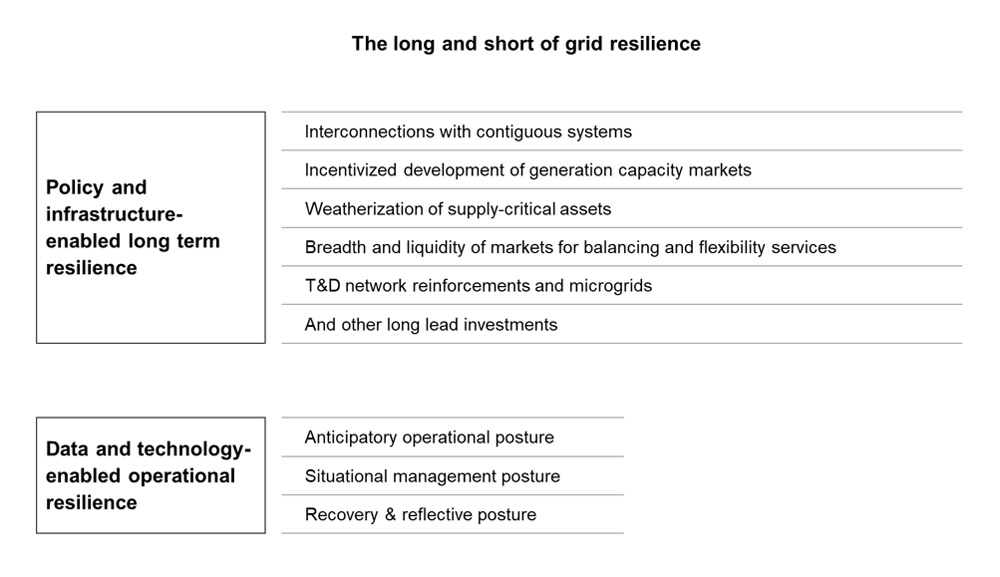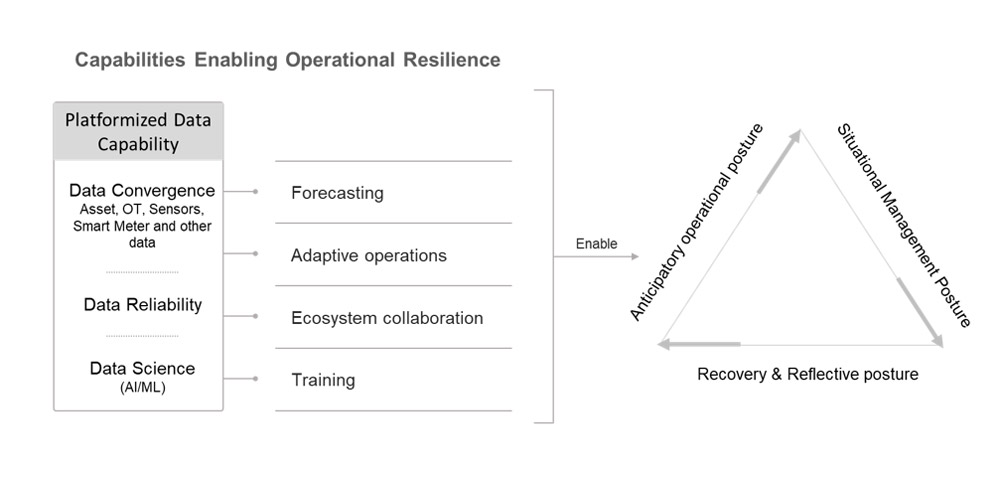With power outages that affected 4.5 million homes and businesses, an estimated economic damage of USD 195 billion and many customers facing the prospect of sharp spikes in their monthly bills, it is not hard to see why the recent Texas power crisis of February 2021 has quickly become a subject of intense analysis and debate.
Early analysis points to a complex cocktail of factors at play. The challenges of operating generation assets not adequately winterized to withstand extreme cold weather; Texas’ choice not to interconnect with other regional grids in order to avoid federal regulatory jurisdiction; the absence of a generation capacity market; an increasing proportion of renewable power in the state’s overall energy mix; these are all factors worthy of dissection. Active debate and soul-searching is already underway as Texas recovers and learns from this event.
However, the Texas winter storm is only illustrative of other extreme weather-related events that are expected to unfold with greater frequency and unpredictability. The message is loud and clear, even though the timing is not the most convenient; electric grid operators across the world must make urgent interventions to render their networks and operations more resilient, even as they grapple with the legacy of a carbon centric economy.
The long and short of a resilient power grid
A variety of capabilities goes into enabling resilience of the electric grid. Some require long gestation periods. These long-lead capabilities are typically in the energy policy, regulation and infrastructure investment domains. Investments in reinforcing transmission and distribution (T&D) networks, empowering and enabling community grids, interconnections, and deepening and broadening markets for balancing and flexibility services are examples of such long-lead capabilities.
While these long-term capabilities evolve over time, there is a more pressing need and an opportunity for T&D operators to evolve greater operational resilience in the present by extending their data and technology investments.
This here-and-now dimension of operational resilience is the focus of the remainder of this article. Specifically, T&D companies need to continuously evolve a sophisticated operational posture that enables them to:

Organizing principles for operational grid resilience
T&D operators face a triple whammy of factors that threaten resilient operations. In addition to building the capability to deftly manage widespread disruption from extreme weather events, operators also have to be vigilant against disruptions from cybersecurity risks. Simultaneously, they have to keep up with these capabilities at a time when networks and operations are getting increasingly complex due to accelerating trends such as distributed energy resources (DER) and changes in consumption patterns, trends that require operators to continuously adapt to new supply and demand topologies.
Sustaining resilience of grid operations in this context requires the capability for operators to anticipate a variety of scenarios, understand system vulnerabilities intimately, model a range of responses, quickly sense and adapt to changes, and sustain workforce skills to align with these expectations.
At the heart of this range of capabilities is data and the ability to put the data to work in a variety of ways.
Electric utilities have historically developed deep expertise in operational technology (OT). More recent trends have deepened their data and technology investments. Progressive utilities continue to actively invest in and grow specialized capabilities such as Active Network Management (ANM), upgraded Outage Management Systems (OMS), and advanced sensors such as phasor measurement units (PMUs). Companies are also deploying advanced strategies for IT and OT convergence and data integration. We are also witnessing a gradual mainstreaming of data science-led solutions for operational decision-support.
The opportunity now for electric T&D companies is to build on these investments to deliver the capabilities that will enable a more proactive operational posture and a more resilient operation in the face of high-impact disruptions.
In building a robust set of capabilities to enable service and operational resilience, it is vital that utilities start with a platformised view of their data strategy that will then enable the systematic and orchestrated evolution and sustenance of advanced capabilities essential to adaptive and resilient operations.

At its core, a platformised data approach institutionalizes the data-as-an-enterprise-asset mindset. It provides the protocols and tools for data reliability and security, ease of access, ease of data integration across enterprise, OT and device data, artificial intelligence and machine learning (AI/ML) capabilities, and integration of solutions with business processes. With cost pressures only growing for utilities, the platformized data approach also calls for a judicious leverage of ‘on demand’ consumption models, while brooking no compromises with stringent security requirements.
An evolving data capability will then allow grid operators to rapidly build specific business capabilities that facilitate operational resilience as summarized in the table below.
Operational capabilities… |
…and their role in enabling grid resilience |
Forecasting Agile and accurate forecasting is key to preparing for and responding to high impact disruptions |
Accurate forecasting facilitates an anticipatory and responsive operational posture. This includes short term, day ahead and within day forecasting of electric demand across customer and network segments; supply profiles from baseload, renewable, DER and other sources; grid inertia for various supply and demand profiles; energy and ancillary service prices; vulnerable segments in the network; customer call volumes in the event of outages. |
Adaptive operations The ability to anticipate and adapt to disruptions with minimal loss of service requires reliable simulation, modeling and optimization capabilities |
T&D operators have the opportunity to operationalize a range of business capabilities that drive adaptability to out-of-the-normal situations. For example:
|
Ecosystem collaboration Power system participants need the ability to exchange information and collaborate during a crisis for an effective and orchestrated response |
As the orchestrator of the grid, the system operator is uniquely positioned to facilitate fluid collaboration and information sharing amongst generators, networks, balancing service providers, aggregators, large customers, data agencies and others to enable coordinated responses and recovery during disruptions. The Transparency Platform operated by ENTSO-E in Europe is a good example of an essential operational data sharing initiative. There is also a need and an opportunity for advanced situational awareness tools that enable a consistent and real-time view amongst system stakeholders of important parameters during a crisis. |
Training The quality of operator and technician skills are the primary determinant of the efficacy of crisis responses. |
Investing in event simulators and sandboxes to train technical personnel will become an increasingly essential capability especially in light of the increasing complexity of power grids . |
The good news is that progressive utilities are starting to invest in upgrading these capabilities. For example, Wipro’s specialists in the power grid domain are helping customers in the US, Europe and other markets develop advanced capabilities in areas such as storm hardening and grid inertia management.
The unpredictability and severity of extreme weather events and the potential for disruptive cyberattacks necessitate a greater degree of preparedness and agility on the part of electric utilities and system operators. Whilst a range of policy measures, reforms and infrastructure investments will enable a more resilient grid in the longer term, power companies have the opportunity right now to accelerate their investments and sharpen the focus on data and technology-driven capabilities to ensure a more adaptive operational posture and resilient service. This article has laid out the framework and organizing principles to achieve this systematically. In our subsequent post, we will describe how T&D operators can evolve and operationalize this capability.
The above article is featured in the “What's Next 2021” section of “The State of the Digital Utility” report by TMG Consulting. In that version of the article, the co-authors are Shirish Patil and Geoff Jue. Click here to read the report.
Shishir Patil leads Wipro’s Utilities Sector Domain and Consulting Group, in which Krishna RS and Sridhar Krishnan are senior practitioners. The authors wish to acknowledge the expert input from their colleagues Sujan Bose, Ramesh Dolu, Vijay Dwarkanath, Jignesh Thakkar, and Dinesh Abhimanyu Rajan.